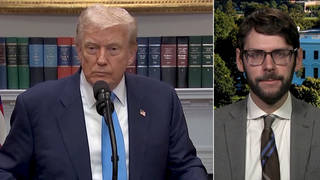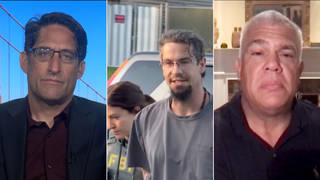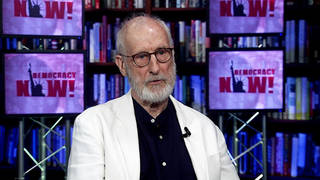
In New York state, the Green Party hopes to make major gains in the race for governor. Its candidate, Howie Hawkins, is taking on incumbent Democrat Andrew Cuomo, Republican Rob Astorino and Libertarian Michael McDermott. Hawkins is one of more than 200 Green candidates running for office across the country on Tuesday. Hawkins is calling for a “Green New Deal” that includes public jobs for the unemployed, single-payer healthcare, a ban on fracking and a 100 percent clean-energy future. Last week, he participated in four-way gubernatorial debate where Democracy Now! co-host Juan González questioned Cuomo about his record of dealing with corruption.
Transcript
JUAN GONZÁLEZ: As we continue our election coverage, we’re joined by another Green Party candidate, Howie Hawkins, who is running for New York governor against Democrat Andrew Cuomo, Republican Rob Astorino and the Libertarian candidate, Michael McDermott. Hawkins is one of a number of Green candidates running for office across the country on Tuesday.
AMY GOODMAN: We welcome you to Democracy Now! It’s great to have you with us. Talk about your platform. We were just speaking with the Green Party mayor of Richmond, California. There are Green Party candidates around the country.
HOWIE HAWKINS: Well, we call it a Green New Deal for New York. It involves five basic economic human rights that have been on the table since the mid-1930s—the Committee for Economic Security with Frances Perkins as chair, Roosevelt’s 1944 State of the Union address calling for a second economic bill of rights. The civil rights movement brought it up again between the March on Washington, in 1963, for Jobs and Freedom and the Poor People’s Campaign. And these are the rights to a useful job, a living wage, affordable housing, healthcare and a good education.
And then we call it the Green New Deal because the centerpiece of our program is to fight climate change by banning fracking and committing to 100 percent clean energy by 2030. And we think that addresses the problems we face in this state. We’re the most—we have the state with the most unequal distribution of income of any state in the United States. We have the most segregation by both race and class in housing and schools. And none of the two major-party candidates are addressing these issues, and we think we have a program that does.
AMY GOODMAN: I wanted to turn, Juan, back to the debate, the only, I think it was, televised debate in the state. It took place last week, and our very own Juan González, who is a reporter and columnist also with the New York Daily News, asked the opening question, and that went to incumbent Democratic Governor Andrew Cuomo about the Moreland Commission.
JUAN GONZÁLEZ: You appointed a special panel, the Moreland Commission, to root out corruption in Albany. But you suddenly abolish your own panel, less than a year ago. And press—less than a year later. And press accounts say your aides pressured its members to squash certain investigations. Manhattan U.S. Attorney Preet Bharara is now probing what happened. How do you respond to those who call this the “darkest stain” of your first term? And can you assure us tonight that your office never sought to interfere with the Moreland Commission or any attorney general investigations prompted by it, or even the current federal probe?
MODERATOR: Mr. Cuomo, you have one minute.
GOV. ANDREW CUOMO: Yes, I can. And I thank you for bringing up—bringing it up, because there’s been a lot of misinformation, and this is an opportunity to clear it up. Two basic points. Number one, we appointed a commission, and I said to the chairman of the commission, who happens to be the pre-eminent district attorney in the state of New York, in my opinion, happens to be a Republican, Chairman Fitzpatrick, “You make all the decisions.” Yes, people gave him advice. He had public hearings. My staff talked to him. Everyone’s staff talked to him. But he has repeatedly said he made all the decisions independently. He’s been saying that for months in numerous mediums.
Second, there was no abrupt stopping. I wanted the commission to get a law passed. That’s why I empaneled it. I said to the Legislature, “When you pass the law, the commission will go away.” They passed the law. The law has an independent enforcement agent, redefined “bribery,” was applauded by all the DAs. And that’s what we needed, was a new law so the DAs could actually prosecute. And that’s what we produced.
AMY GOODMAN: That’s Governor Cuomo in the statewide debate that was held, Juan González questioning him, throwing out that first question on the Moreland Commission. Juan?
JUAN GONZÁLEZ: Yeah, it was interesting, the governor’s response. Howie Hawkins, you also and the other candidates responded. But then also, on the fracking question that came, as well, you raised a similar problem to what is being alleged in the Moreland Commission cover-up, which is the governor’s office’s attempt to squash some findings of a U.S. Geological Survey report on fracking. Could you expand on that and also what the governor said about the Moreland Commission?
HOWIE HAWKINS: Governor Cuomo is Nixonian in the way he covers up and dissembles. There was the Commission on Public Corruption, which there he was saying was independent, but when he shut it down, he said, “It’s mine. I created it. I can shut it down.” Then the next week he’s saying it’s independent. You know, which is it? There was the earlier Moreland Commission on Public Utilities. That was written up in The New York Times yesterday. He tried to get that changed. He didn’t like the results of this study which said fracking could pollute the water through various infrastructure. So, you know, I think that signals what he’s going to do, because he also said in the debate—
JUAN GONZÁLEZ: Well, he not only didn’t like it, but according to the report in Capital New York website, his people directed them to change or pressured the federal scientists to change their findings.
HOWIE HAWKINS: Right, and that blows up his whole argument that he’s waiting for the science to decide on fracking. And then, on Common Core, on another thing, you know, he said, “Who? Me? Common Core, I have nothing to do with it,” when in fact, you know, he signed things with the National Governors Association putting New York into that program and appointed John King, who’s been a very—the state education commissioner, who’s been a very forceful advocate for that. So, you can’t trust what he says.
AMY GOODMAN: What is it like to run for statewide office as a Green Party candidate, for people who are watching this around the country, and for people outside this country, where more parties are involved in electoral politics in other countries?
JUAN GONZÁLEZ: And for you, who is a UPS driver in your regular life?
HOWIE HAWKINS: Well, frankly, it’s a lot of fun, and we get to talk to a lot of people. I mean, I’m running with a group of people. We’re a rainbow ticket. My running mate is African-American teacher, union activist, Brian Jones. Our candidate for attorney general, Ramón Jiménez, has been a people’s lawyer in the South Bronx for 40 years. Our candidate for comptroller, Theresa Portelli, has been a union member working with juvenile justice issues with CSEA for 40 years.
And, you know, it’s like running for local election, because we can’t afford all the broadcast advertising that Cuomo’s got. Cuomo had 331 people give him $22 million. You know, that’s not the 1 percent; that’s a tiny fraction of the 1 percent. Our average donation is 1/100th of his, which is kind of a good metaphor: I’m Candidate 99 Percent, he’s Governor 1 Percent. And so, we talk to people. We get a really good reception. Of course, doing a grassroot campaign in a state with 19 million people is a real task. So, we’re stronger in some areas than other areas, but we’re growing and getting stronger and—
AMY GOODMAN: How did you get on the ballot?
HOWIE HAWKINS: We’re on the ballot because I ran four years ago, I got over 50,000 votes. That gave us an automatic ballot slot. So we just had a convention and nominated our slate. And then we were able to start campaigning back in the spring, instead of doing a big petition over the summer, which we had to do before. So—
JUAN GONZÁLEZ: Well, four years ago, you got about 1 percent of the vote, but now some of the polls are showing you close to 10 percent of support among registered voters. How do you explain this surge of support for your candidacy?
HOWIE HAWKINS: Well, partly, we’re better organized as a party. But mainly, I think Andrew Cuomo has been my best campaign worker. He has pushed people away from him. On the schools, the teachers are angry, because he’s underfunding and he’s imposing these high-stakes tests and the evaluations of teacher based on that. The public workers are upset with him. The parents are upset with this Common Core high-stakes testing regime across the board. Schools are underfunded. My city has lost a quarter of its teaching staff, and Cuomo is about to go into his fifth consecutive austerity budget. His budget director said, “Don’t expect any increases,” to all the agency directors when they submit their budgets. And then the fracking issue is huge. I think after the election, he’s going to go with fracking. I think that’s what all the signals say. And I’m the only candidate that’s calling for a ban on fracking and a commitment to clean energy. So, all those things is pushing people our way.
JUAN GONZÁLEZ: Cuomo even created a new party, or helped support the creation of a new party, the Women’s Equality Party. And many people believe he’s trying to do a counterweight to the Working Families Party, which, ironically, endorsed him, but he’s really not seeking their support. Could you talk about the Women’s Equality Party?
HOWIE HAWKINS: Well, it’s a new wrapper for the old package. You open that wrapper, and it’s the same old Cuomo inside the box. In terms of women’s equality, he’s said nothing about childcare or paid family leave or raising the minimum wage. Most minimum-wage workers are women. So his women’s equality agenda doesn’t address the problems, particularly of working-class women. And then, you know, he’s got other packages. He’s on the Independence line, but he’s not independent of those 331 people that gave him $22 million. And the Working Families Party, just because he’s got that wrapper, doesn’t make him a champion of the working class. His whole term in office has been an attack on working people.
AMY GOODMAN: How do you get covered by the media? How much coverage do you get? And what advice do you give to other not only Green Party candidates, but third-party candidates around the country? You have run, what, almost 20 times now, but you haven’t won.
HOWIE HAWKINS: I got 48 percent for a city council race a couple years ago. We’ve come close. And, well, my advice is, develop relationships with your local media, keep feeding them information—media, journalists—help them do their job. They like getting information. And just keep plugging away. I think we’ve done well, and I think it’s the strongest part of our campaign—earn media, particularly upstate in the smaller markets. We’re covered. When we show up, they want to cover us. I think we’re interesting to them, and we’re serious. We’ve got—we made breakthroughs in the city of New York. You know, New York Times, Daily News, Post have covered us, haven’t in the past, Newsday. When I ran four years ago, my name wasn’t mentioned in those journals. So, we’re still working more on the network broadcast media. But I think we’re doing good. The problem is, we can’t compete with Cuomo’s advertising, which, you know, just swamps the airwaves. And, you know, there’s a big—the big parties got big organization. We’re still building ours at the grassroots. But we’re growing.
JUAN GONZÁLEZ: I wanted to ask you one last thing about charter schools. I asked that question in the debate. You and the Libertarian candidate answered it, but the Republican and Democratic candidates, Astorino and Cuomo, basically avoided it and talked about other things rather than the question I had asked.
HOWIE HAWKINS: Well, yeah, I did answer it, and I actually was thinking of articles you had written a long time ago about—well, four years ago, 2010, about how the hedge fund investors in the charter schools are making money using tax credits, lending money to the schools, and you used Albany as an example. And I wished I had done what they’d done when we got the question on, “Are you going to serve four years.” I basically said yes and didn’t use my whole minute. What I should have done is then turn to our platform for civil rights and racial justice, because Cuomo was pointing the finger at Astorino for not complying with a court order on fair housing in Westchester, but Cuomo doesn’t have a positive program. We do. We want a Cabinet-level civil rights department to deal with the massive segregation we’ve got in New York state. We want a new public housing program that can begin to desegregate, with mixed-income, scattered-site housing. And then we’ve got to address the criminal justice system. I mean, this governor has been very hard-hearted, very few clemencies, three for people already out of prison. We have tens of thousands of prisoners in for nonviolent drug offenses, and we need to get them out of prison and expunge their records so they can have access to jobs, housing and employment. And, you know, the disparities in the criminal justice system are the worst segregation we’ve got.
AMY GOODMAN: We want to thank you very much for joining us, Howie Hawkins. Howie Hawkins is the Green Party candidate for New York governor, running against a Libertarian, a Republican, as well as the incumbent, Governor Cuomo.
This is Democracy Now!, democracynow.org, The War and Peace Report. Speaking of elections, on Tuesday, Democracy Now! will be doing a five-hour broadcast, midterm election night. We’ll be beginning at 7:00 Eastern Standard Time. There are many stations that will be running it. You can also go to our website at democracynow.org. We’ll be covering the ballots. We’ll be covering the close races and the not-so-close races. We’ll be covering midterm elections 2014.
This is Democracy Now!, democracynow.org, The War and Peace Report. When we come back, the Pulitzer Prize-winning journalist for The New York Times, Eric Lichtblau, on his new book. It’s called The Nazis Next Door: How America Became a Safe Haven for Hitler’s Men. You can read the prologue on our website. It’s a fascinating book that looks at how, even after World War II, Jews and others in the concentration camps were held in these camps as displaced persons. And as they were held, so many of them turned away from the United States, a number of some of Hitler’s top men were allowed in, among them the top scientists, recruited by the CIA and the FBI. That’s what Eric Lichtblau will be talking about in just a moment. This is Democracy Now! We’ll be back in a moment.
[break]
AMY GOODMAN: This is Democracy Now!, democracynow.org, The War and Peace Report. I’m Amy Goodman, with Juan González, as we turn right now to the—a problem we’ve just heard is we have a problem with the audio line to the New York Times studios in Washington, D.C., so we’re going to save that interview for next week and turn to the second part of the interview that we have done this week on GMOs, on genetically modified organisms. Juan?
JUAN GONZÁLEZ: Yes, well, Colorado and Oregon could soon become the first states in the nation to pass ballot initiatives mandating the labeling of food products containing genetically modified organisms. Earlier this year, Vermont became the first state to approve GMO labeling through the legislative process, but the decision is now being challenged in the courts. Numerous items are already sold in grocery stores containing genetically modified corn and soy, but companies are currently not required to inform consumers. Advocates of Proposition 105 in Colorado and Measure 92 in Oregon say GMO foods can be harmful to human health due to pesticide residues and the altered crop genetics.
AMY GOODMAN: Earlier this week, we spoke to Tufst University professor Sheldon Krimsky, editor of The GMO Deception: What You Need to Know about the Food, Corporations, and Government Agencies Putting Our Families and Our Environment at Risk.
SHELDON KRIMSKY: The Europeans operate on the precautionary principle. They say, if you introduce a new product on the market, you should evaluate it before the consumers get a chance to purchase it. In America, we made a decision that genetically modified foods are safe before you even have to test it. So the government never required tests for GMOs in the United States.
AMY GOODMAN: Who made that decision?
SHELDON KRIMSKY: Well, that decision was made by a commission, first of all, in the United States headed by Dan Quayle, and then it was—
AMY GOODMAN: The vice president under President Bush.
SHELDON KRIMSKY: Yes, yes, that’s correct. And by the 1990s, the decision was made how to divide the regulatory authority over genetically modified organisms—plants, animals, etc. And there were three agencies. The EPA would deal with environmental effects. USDA would be dealing with how it affects agriculture. And the FDA would be addressing the questions of human health.
AMY GOODMAN: Well, why are you concerned?
SHELDON KRIMSKY: Well, because we have some evidence that animal studies can produce adverse effects when fed GMOs. There have been many studies. Many of them have said there’s no effects. But a few of them—I found 22 studies.
AMY GOODMAN: Give an example of one of these studies.
SHELDON KRIMSKY: Well, one of these studies was published in one of the most important journals in international journals. It’s called The Lancet. It started publishing—
AMY GOODMAN: That’s the British medical journal.
SHELDON KRIMSKY: The British medical journal. It’s among the most prestigious journals in the world. And that was published in 1999 by a scientist who lived in Britain for 50 years—originally he was born in Hungary—Árpád Pusztai. And he was a researcher at the Rowett Institute. And he published a study which showed that his animals were harmed when fed a genetically modified potato.
AMY GOODMAN: That’s Tufts University professor Sheldon Krimsky, editor of The GMO Deception: What You Need to Know about the Food, Corporations, and Government Agencies Putting Our Families and Our Environment at Risk. To see the whole interview, part one and two, you can go to our website at democracynow.org. But it looks like we’ve got the audio fixed to The New York Times in Washington.











Media Options